10 Social Media AI Tools to Increase Your Productivity
Stay ahead in the digital landscape with AI-driven social media tools. Learn how to automate processes and gain valuable insights.

You’re spending 3+ hours every day writing captions, scheduling content, and tracking your social media content performance. That’s a whopping 15+ hours a week that you can redirect to social media strategy and creative work.
This is where social media AI tools help. They handle repetitive, data-heavy tasks so you can focus on growing your business.
I tested several tools over the past few months to see which ones actually save time without sacrificing quality. This guide covers the 10 best AI tools for social media, what each tool does, where it falls short, and what kind of business it's best for.
Key takeaways
-
Socialinsider: To effortlessly benchmark your performance, analyze content pillars, and get actionable insights across all major social channels in one dashboard.
-
Quid: For powerful AI for predicting trends and visualizing consumer sentiment across huge datasets, making strategic decisions clear for enterprise teams.
-
Dash Social:Excels in text-based brand sentiment in real time with customizable, easy-to-read dashboards focused on your brand’s health.
-
Flick: Using it, you can plan, create, and schedule optimized content in advance with AI-powered post ideas and robust hashtag research in one intuitive tool.
-
Buffer: To Qquickly schedule, publish, and track posts across 10+ social platforms with a streamlined interface and built-in AI content assistant.
-
Jasper: Allows you to create consistent, high-performing copy and visuals at scale with AI that learns and preserves your unique brand voice.
-
Pedris.ai: Helps you instantly generate carousels, videos, and ad creatives from a simple prompt, with deep Shopify and competitor integration for ecommerce brands.
-
Publer: Enable syou to produce unique AI-generated visuals and bulk-schedule hundreds of posts, all while managing platform customization and visual branding with ease.
-
VEED: Excellent for turning simple text prompts into polished, branded videos with browser-based editing, automatic subtitles, and voice cloning for global reach.
-
Opus Clip: For effortlessly transformmation of long videos into multiple ready-to-share social clips, complete with auto-captions and smart viral moment detection.
What part of social media marketing can be optimized through AI Tools?
But first, what aspects of social media marketing can AI improve?
Competitor and industry benchmarking
AI watches your competitors for you. It pulls public data from their account and uses its algorithm magic to give you insights into their performance.
It then measures and compares your performance against your competitors in the industry to show you where you stand and identify trends and gaps in your strategy.
Engagement and performance analysis
AI digs through a plethora of data to tell you what’s actually working. It identifies your top-performing posts, optimal posting times, and engagement patterns.
This gives you insights to make your content even better and plan your posting schedule based on real data for maximum impact.
Trend analysis
AI figures out which hashtags help you get seen, which emerging trends you need to jump on asap, and what keywords people are currently talking about.
Automation and reporting
Hate numbers? You’re not alone.
AI handles the complex task of meticulously combing through data and building easy-to-understand performance, detailed analytics, and comparative reports.
Once done, reports arrive in your inbox ready for presentation.
Content categorization and strategy
AI automatically sorts your social media content into “content pillars” (such as industry news, customer testimonials, promotions, etc.) based on captions and context. This helps you understand which types of content drive the most engagement and which one’s flopping.
You can also manually tag posts or set up rules for automatic tagging, making it easier to analyze performance by campaign or theme.
A. AI social media analytics and listening tools
Let me tell you a bit about the 10 top social media AI tools and whether they’re worth the investment.
#1. Socialinsider - best for social media content analysis
Socialinsider helps you understand what content really works - and why. It provides in-depth analytics for all your major social platforms including Facebook, X/Twitter, Instagram, YouTube, LinkedIn, and TikTok.
If you’re a social media professional managing complex social media strategies, Socialinsider delivers all the competitive intelligence and content performance data you need to make smarter decisions.
And with all the new updates it’s been rolling out - including enhanced AI content pillar analysis, conversational AI (to be launched soon), and improved competitive benchmarking - it’s fast becoming one of the most popular social media AI tools.
Main capabilities:
- Auto-tagging content and AI-content pillars analysis: Socialinsider automatically tags your posts and groups them into content themes like promotional posts, educational content, product launches and so on.
You can then easily analyze which of these content themes are generating maximum engagement.
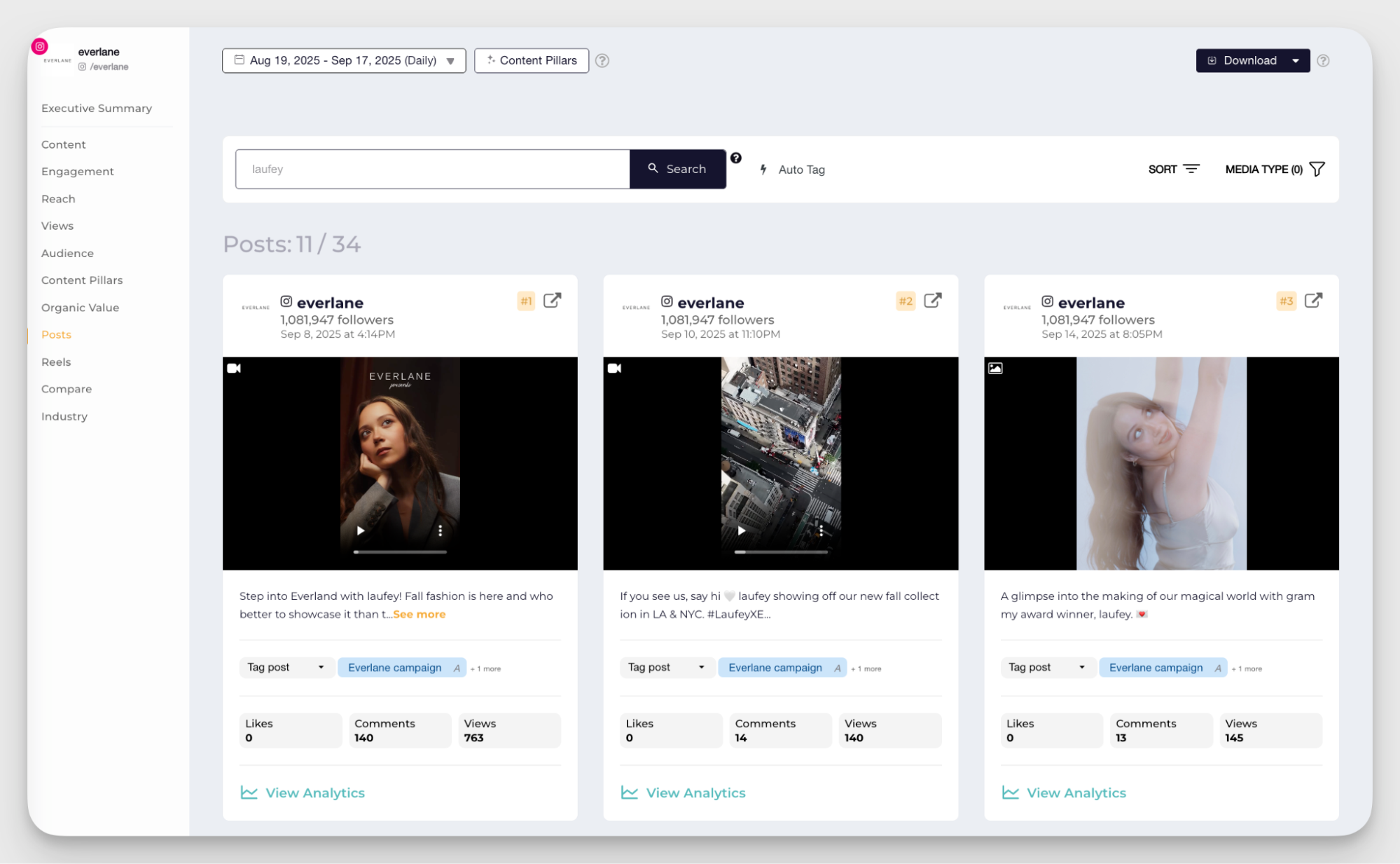
What I particularly like about Socialinsider's content pillars feature is that you can analyze both brand-specific content pillars - like specific brand campaigns - or use its AI-based industry content pillars, quickly identifying trending topics in a niche.
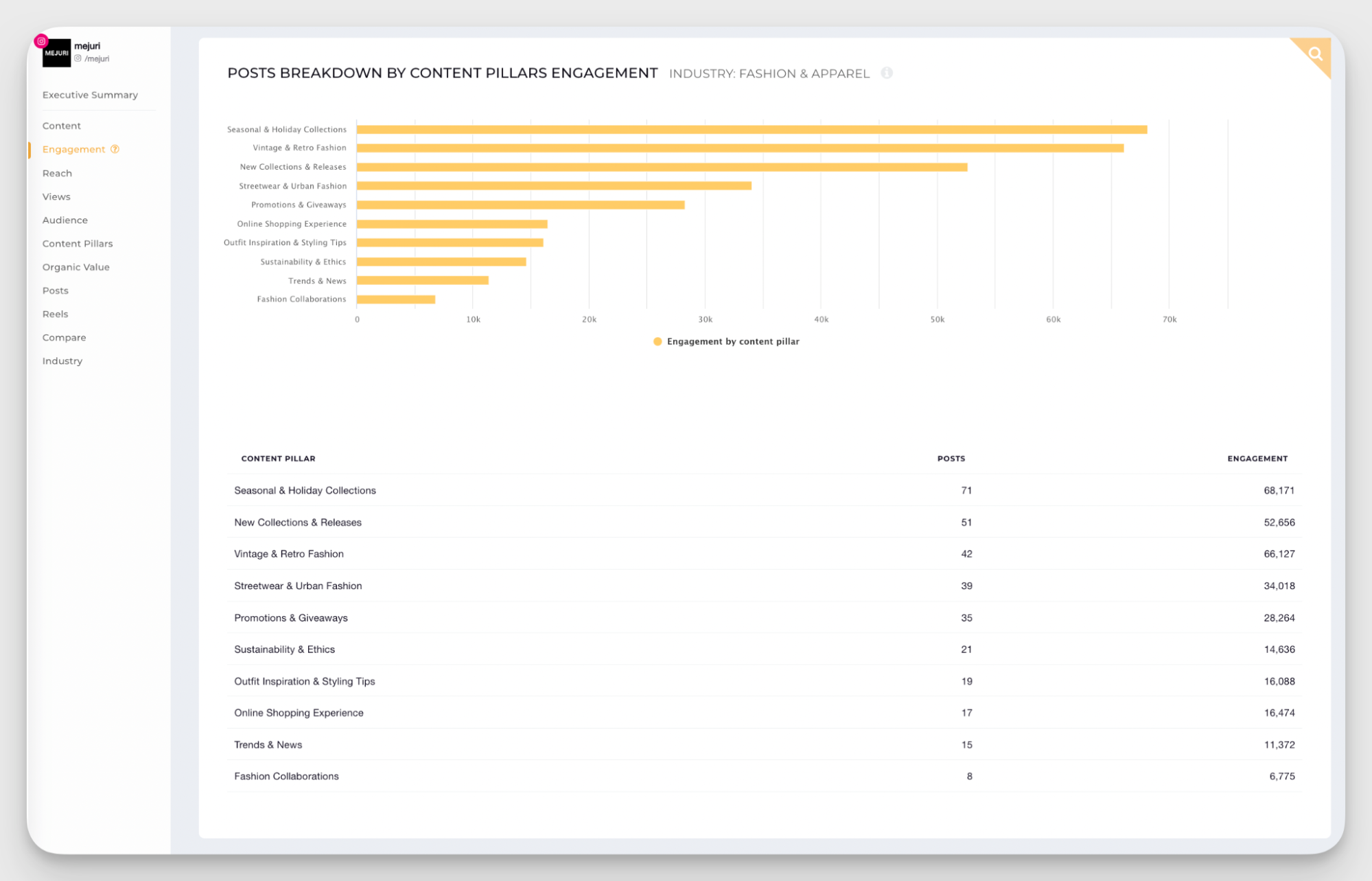
And what's even better is that it also works at the cross-channel level.
- Benchmarking and AI-generated performance executive summaries: With Socialinsider, you can compare your strategy against your competitors by analyzing different KPIs like engagement, followers, followers growth, and so on.
Just add your competitor's profile to the dashboard, and watch Socialinsider track their posting frequency, content mix, engagement rates, and growth metrics.
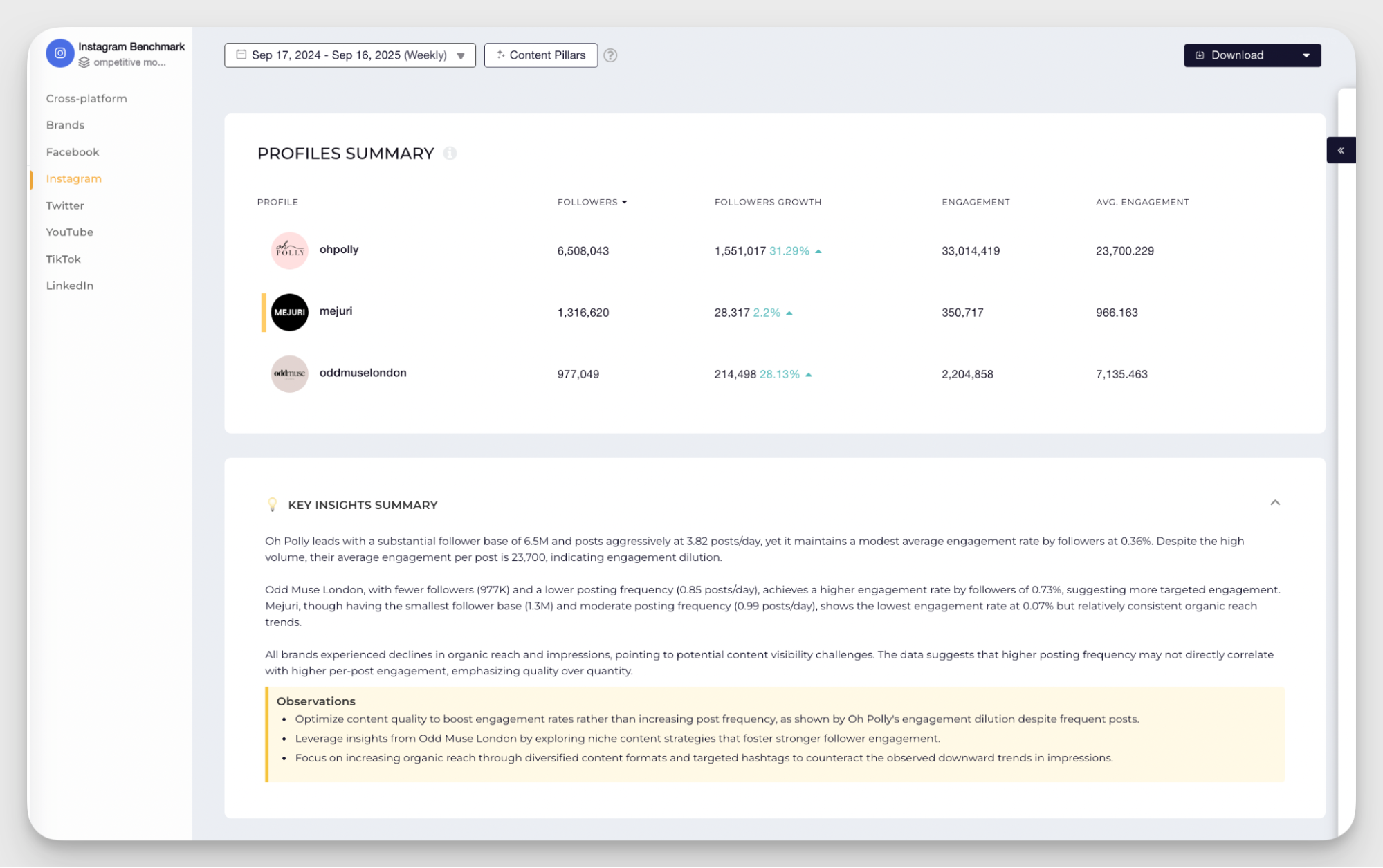
And when you add a profile (whether your own or a competitor's) on the dashboard, you’ll get access to an executive summary of its social media performance - an analysis of the performance at account, brand, and industry levels - in layman-friendly language.
- Cross-channel analysis and actionable optimization insights: Socialinsider brings together all your social media analytics data in one place and compares performance across different platforms.
This way, it's easy to see which platform works best for which of your marketing goals - for example, TikTok for virality or Instagram for engagement.
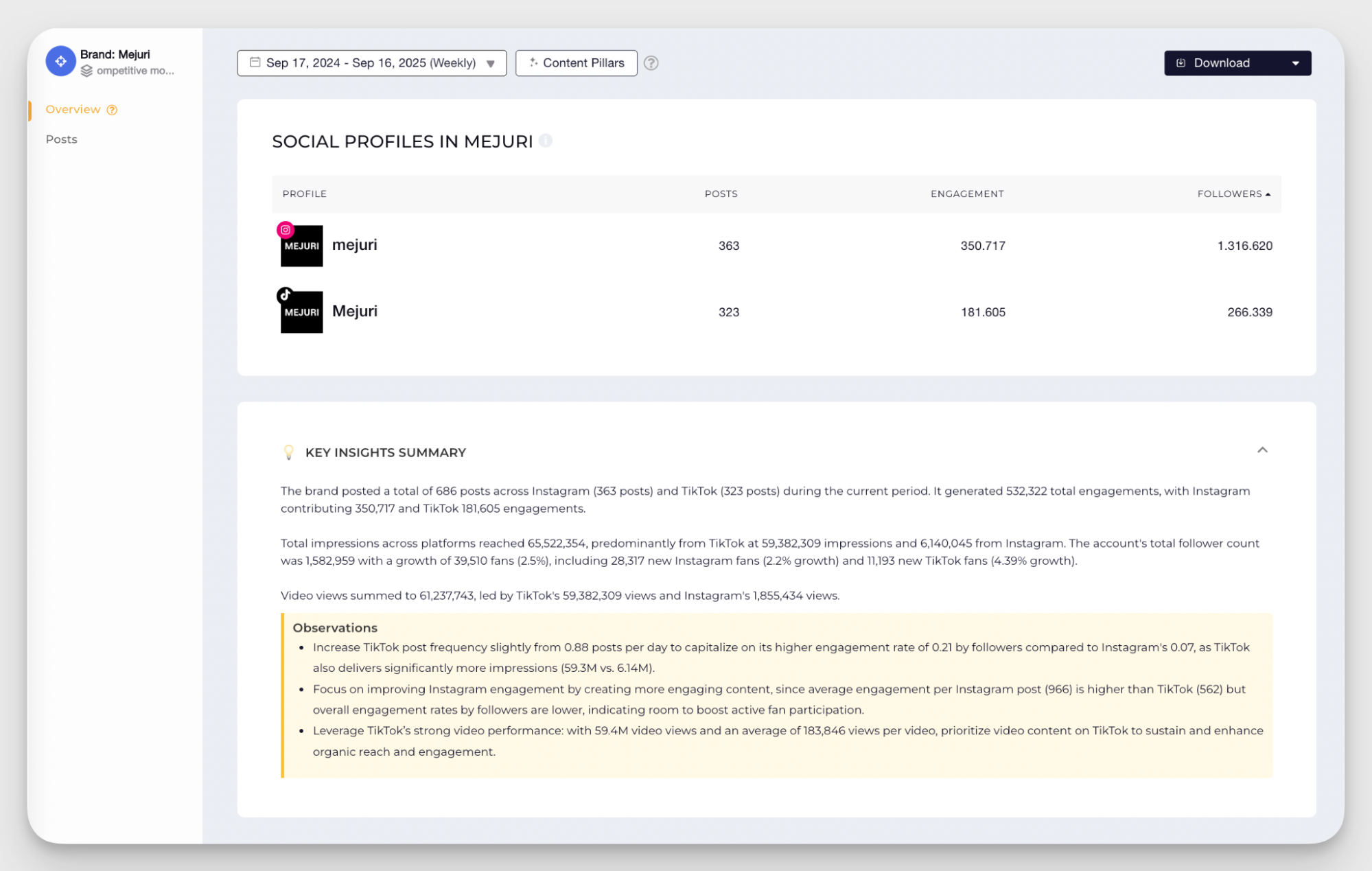
Here's where it completely won me over: it will also further analyze all your data and give actionable insights to optimise your profiles and meet your business goals more effectively.
- Socialinsider AI - conversational insights (soon to be launched, so stay tuned): It will allow you to ask questions like ‘Which content pillar drove the most engagement last month?’ or ‘How do my Instagram Reels perform compared to carousel posts?’ and get AI-generated answers based on your data on Socialinsider.
Socialinsider has multiple pricing tiers.
- Adapt Plan: $82/month or $990/year
- Optimize Plan: $124/month or $1,490/year
- Predict Plan: $199/month or $2,390/year
- Enterprise Plan: Custom pricing (contact sales)
Pricing
I think Socialinsider is perfect for businesses looking for deep content analysis, competitive benchmarking, and understanding the why behind your performance.
It gives you all the insights you need to stop flying blind without the data, but you need to know how to turn the numbers into effective action.
Reviews
Dorra L, Director in Marketing & Advertising says: Before using Socialinsider, we were not able to have a platform allowing us to have consolidated reporting for our clients and their competitors. With Socialinsider we are able to reduce the time spent on reporting, allowing our Social Media Managers to spend more time on providing added value to our clients.
#2. Quid - best for consumer trends insights
I see Quid is an AI analytics platform for large corporations that turns messy social media data, customer feedback, and market signals into clear consumer trend insights. The best part about it? It pulls together data from multiple sources and uses AI to help you spot emerging patterns, track sentiment changes, and keep tabs on your competition (all in real time!)
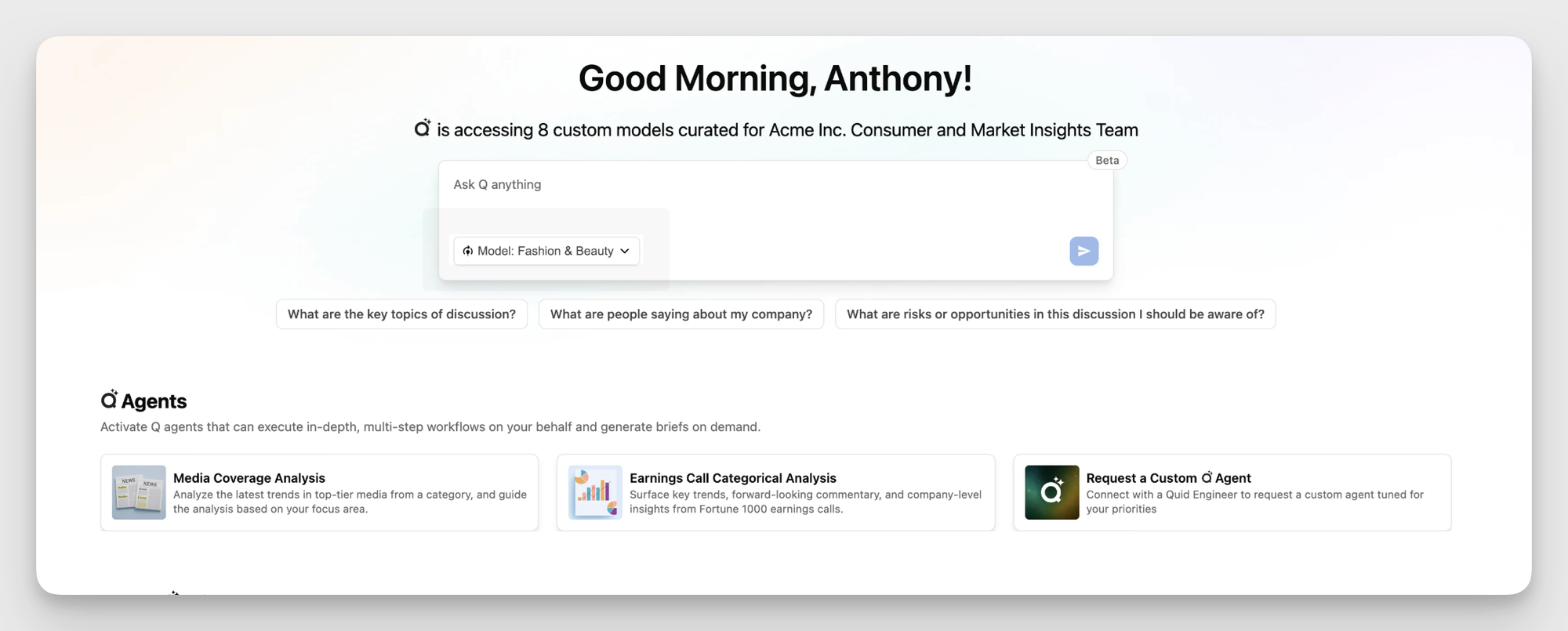
Main capabilities:
- AI powered trend detection: Quid’s predictive analysis feature automatically finds the latest trends before they blow up. What caught my attention about it is that it also identifies patterns via news, surveys, and emerging reports (that would take your hours to find).
For social media strategists, this means you’re always one step ahead of trends, instead of scrambling to catch up.
- Advanced visualization mapping: If your ask, me, this is where Quid really shines. Why is that? Because it takes big data and transforms it into visual maps that actually make sense. You can spot audience behaviours, trend shifts, and even your audience’s sentiment changes at a single glance.
- Comprehensive sentiment analysis: What I liked about Quid was that it doesn’t just tell you ‘people like your product’, or ‘customers are frustrated with your services’. It looks at multiple sources of customer opinions - social media comments, survey responses, customer reviews, and even unstructured feedback like forum discussions - to tell you what customers really feel about your brand - positive, negative, or neutral.
- Brand health monitoring: Quid monitors your brand's vital signs across all the digital channels - things like mention volume, sentiment trends, conversation topics, and share of voice. It then gives you an early warning if things are going south and not as planned, so you can jump in with your contingency plan.
Similarly, it also highlights when new opportunities come up, so you can benefit from them.
Pricing
Here's something that's not quite my cup of tea — Quid uses custom pricing based on your company size, industry, and how much data you're working with. There's no public pricing available, so you'll need to reach out to their sales team for a quote.
Best suited for
If you ask me, I'd say Quid is best for large enterprises and established teams with a strong social media team and complex analytics needs. Because you’ll need both budget and team bandwidth to make full use of this platform.
Reviews
Marshall Z, Senior Data Strategist says: “Though it might take a bit to learn it, if you have a competent team and time to look through the posts, it's one of the best options.”
#3. Dash Social - best for sentiment and brand health reports
Dash Social is a visual-first AI platform that tracks how your audience and customers feel about your brand across different social channels.
What I loved the most when trying it was that instead of just focusing on text-based data, it also takes into account visual data of your brand - like pictures, reels, carousels, etc - and gives you a lowdown on what’s working and what’s flopping.

Main capabilities:
- Multi-source data collection: Dash Social doesn't just look at what your audience is saying in captions or comments. Because it’s a visual-first AI social media tool, it takes into account your audience’s sentiment on images and videos, as well, which allows it to gather multiple-source data for your brand. Pretty coo, right?
- Comprehensive brand health reporting: Are people generally positive, negative, or neutral about your brand over time? Which specific products or campaigns are resonating vs. falling flat? How does your brand sentiment stack up against competitors in your space?
These are all questions that I constantly ask myself. Luckily, Dash Social tracks multiple indicators to tell you how healthy your brand is.
- Clear, visual dashboards: As a social media professional, you want data in an easy-to-digest manner. Am I right? And Dash Social does not disappoint on that. It provides customizable dashboards that visualize trends through charts, graphs, and easy-to-read summaries for sentiment and brand health reports. All this information is available to view at a glance.
- Advanced community management with automation: Here's something that I found really useful. Dash Social allows you to tag, filter, and analyse comments and messages across all your social platforms to understand audience sentiment in real-time.
It’s recently launched new Community Automation feature automatically tags and archives messages based on your preferences, saving you lots of time.
Pricing
Dash Social offers four main pricing tiers:
- Grow: $499/month
- Engage: $899/month
- Advance: $1,599/month
- Enterprise: Starting at $2,999/month
Dashsocial also offers a 14-day free trial so you can test the platform before investing in it!
Best suited for
If you ask me, I'd say that Dash Social is best suited for visual-first brands like fashion, retail, luxury, and beauty. I think it’s best for B2C brands, where social media is a primary marketing channel.
So if your audience lives and breathes visual content and you want to find out what they think about your brand's visual content, Dash Social is the best platform for you.
Reviews
Nicole C, Head of Marketing in Cosmetics Industry says: "Really easy setup process. The team is really friendly and helpful, always available. We catch up regularly and also receive helpful weekly and monthly reports. They are quick to onboard new features as needed - e.g Reels and TikTok. It's really levelled up our social media capabilities, and I don't know what we'd do without it."
B. AI tools for social media planning and publishing
#4. Flick - best for social media planning
Flick is an all-in-one social media AI tool that takes the stress out of content creation, content scheduling, and strategy. This super-powerful AI-powered content creation tool helps you plan optimised content months in advance.
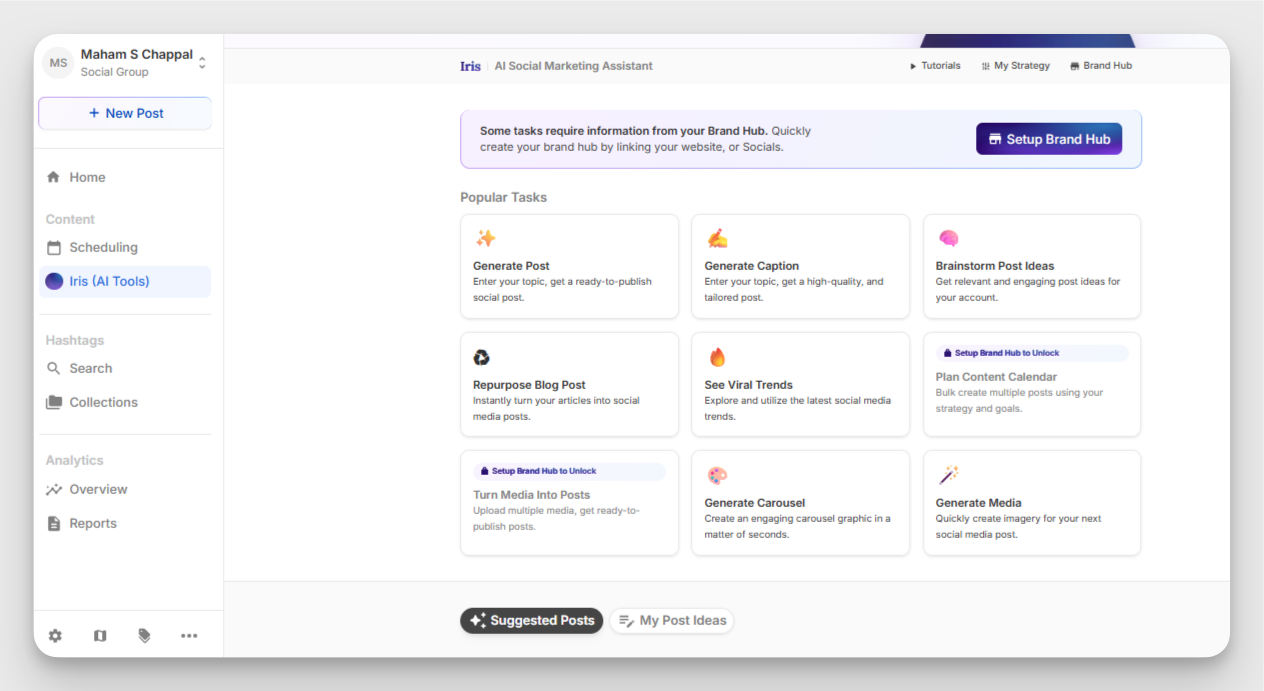
Main capabilities:
- AI content assistant (Iris): Iris helps you brainstorm post ideas by topic, generates detailed post concepts complete with titles and production tips, and then creates the draft post for you. All that’s left is to play around with the post till it's perfect.
- Multi-platform scheduling: An easy drag and drop scheduler that lets you schedule content across all platforms (Instagram, Facebook, LinkedIn, and TikTok) from one place. I liked that it also shows you the best times to post based on your audience’s activity.
- Advanced hashtag research and tracking: Flick’s hashtag tool is genuinely impressive. It generates quality hashtags in seconds, gives personalised suggestions based on your page, and even tracks how each hashtag performs on your posts.
Flick monitors where your posts rank in hashtag feeds over time, giving you a holistic view on what works and what doesn't.
- Content repurposing: This is something that I really liked. Flick analyzes what kind of content worked for your brand before and helps you repurpose your content accordingly.
Pricing
Flick offers three pricing tiers (all prices in GBP, billed annually):
- Solo: £11/month ($14 USD approx) - 4 social profiles, 1 user, 30 scheduled posts per month per social, access to some features
- Pro: £24/month ($30 USD approx) - 8 social profiles, 2 users, unlimited scheduling, access to all features
- Agency: £55/month ($69 USD approx) - 20 social profiles, 5 users, unlimited scheduling, access to all features
Add-ons: Extra social profiles for £4/month, extra users for £8/month
Best suited for
I'd position Flick as an excellent tool for content creators, influencers, small and medium-sized businesses managing their own social media, and agencies managing multiple client accounts. So, basically, anyone who wants to streamline their social media content creation.
Reviews
Maëlle V, Social Media Manager and Content Creator says: "Flick allows easy scheduling and management of posts across multiple platforms, ensuring your content goes live at the best times without you needing to be online."
#5. Buffer - best for social media publishing
In case you didn’t hear about it before, let me tell you that Buffer is one of the oldest (and most popular!) scheduling tools in the social media world.
It’s built for content creators, small businesses and social media teams that want to plan and schedule content across multiple social platforms without losing their minds.
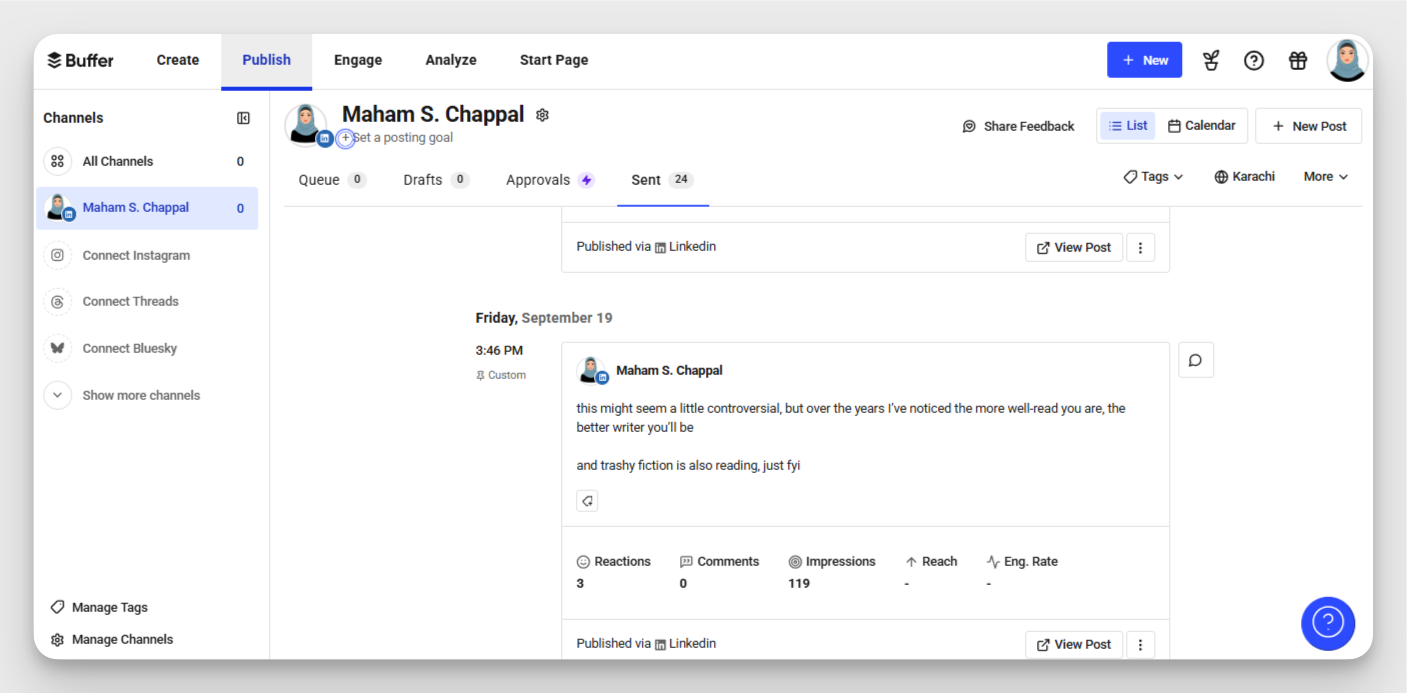
Main capabilities:
- Multi-platform scheduling: Buffer allows you to schedule content across 10+ platforms from a single queue. You can plan weeks and even months worth of content in advance and add it to the queue. You can view all of your scheduled content at a glance via Buffer’s visual calendar.
- Create space planner: Park your ideas in the Create space and then add them to your calendar when you’re ready. In the Create space you can brainstorm, draft and refine your posts easily.
- AI assistant: An excellent feature that helps you generate content ideas, refine your captions, and repurpose existing content for different platforms.
- Posting goals and streaks dashboard: Visually track your posting streak and see if you’re hitting your posting goals through this dashboard. An effective way of staying motivated to post consistently.
- Integrations: What surprised me was that Buffer offers integrations with over 400+ applications, so you can easily import content from anywhere you like.
- Start page link-in-bio builder: Create a simple landing page that combines all your important links in one place. Great for Instagram bios, TikTok profiles, or anywhere else that doesn’t allow you to share more than one link.
- Built-in analytics: Track reach, clicks, and engagements across all your posts in an easy-to-view and understand way.
Pricing
Buffer uses per-channel pricing (billed annually):
- Free: $0 - 3 social channels, 1 user, 10 scheduled posts per channel, 30-day analytics, basic features
- Essentials: $5/month per channel - 1 user, unlimited scheduling (up to 2,000 posts), AI assistant, unlimited analytics history, engagement inbox, Start Page builder
- Team: $10/month per channel - Unlimited users, approval workflows, custom permissions, team collaboration tools, advanced analytics, priority support
- Agency: $100/month for 10 channels (additional channels extra) - Everything in Team plus client management, white-label reports, premium support, account manager
Best suited for
Like Flick, Buffer works best for people on a budget who do not need deep reporting or comprehensive analytics tools.
Reviews
Andrea C, Photographer and Filmmaker says:
Buffer's standout feature is its incredibly intuitive and streamlined scheduling platform, allowing users to effortlessly plan and automate their social media content across multiple networks with remarkable ease and reliability.
C. AI tools for social media content creation
#6. Jasper - best for copywriting
If you’re looking to pump out high-quality content consistently, like blog posts, social media captions, product descriptions, or even ad copy, I'd say Jasper is the AI tool for you.
Unlike other AI copywriting tools that generate cookie-cutter outputs, Jasper actually understands marketing. It’s been trained on high-performing copy and is powered by features that keep your brand voice consistent across everything you create.
Main capabilities:
- Jasper Canvas - intelligent workspace: This is a feature that I absolutely love. Canvas is a collaborative workspace where you can plan entire campaigns, create content, and manage execution - all in one place.
From mapping out complicated campaigns to keeping your team aligned, it helps marketing teams immensely with content creation.
- AI agents for marketing: Jasper recently introduced their AI agents that work independently to handle various marketing tasks like campaign planning, content creation, and SEO audits. They automate all the repetitive tasks (that nobody wants to do) so you and your team can handle strategy and the creative side of content creation. Isn't it great?
- Brand voice & Jasper IQ: If you ask me, this is where Jasper outshines other AI content tools. You just have to feed Jasper your brand style guide or upload examples of your work, and Jasper will mimic your brand voice, tone, and messaging.
- 100+ marketing - specific templates: No time to create content from scratch? No problem. You can easily use Jasper’s pre-built templates for blog posts, product descriptions, email sequences, social media posts, ad copy, landing pages, and more. You can even create custom content templates tailored for your unique workflows.
- Multilingual Content Creation: Jasper allows brands to create content and optimise it in over 30 languages.
- SEO Optimization & Integrations: Jasper integrates with Surfer Pro to help you optimise your content. It also connects with several other marketing tools like Google Docs, Zapier, Canva, and Grammarly to fit seamlessly into your existing tech stack.
- Jasper Art - AI Image Generation: Want to generate visuals to go with your content? Jasper to the rescue. From social media graphics to blog post visuals, Jasper Art generates images based on your prompts - no need to go through stock picture websites.
Pricing
Jasper offers two main pricing tiers for 2025:
- Pro Plan: $59/month per seat (billed annually) or $69/month (billed monthly)
- Business Plan: Custom pricing (contact sales)
Best suited for
My take? Jasper works best for marketing teams that create content at scale.
It’s also a valuable tool for social media professionals creating platform-specific content while maintaining brand consistency and email marketers crafting compelling subject lines and campaigns that drive conversions.
I'd say it is not ideal for people who just need a little help with content creation here and then. It’s for teams that generate a lot of content.
Reviews
Tamim Ahmed, Content Moderator says:
The user interface is very clean and easy to navigate, even for someone new to AI writing tools. The learning curve was surprisingly low.
#7. Pedris.ai - best for generating carousels and ad creatives
Pedris.ai is an AI content creation tool that generates complete social media posts - images, videos, carousels, captions - with just a few words of input.
Type a simple prompt like ‘hair care solutions’ and Pedris.ai will generate 6 to 7 post variations with captions, visuals, on-brand copy, even hashtag suggestions.
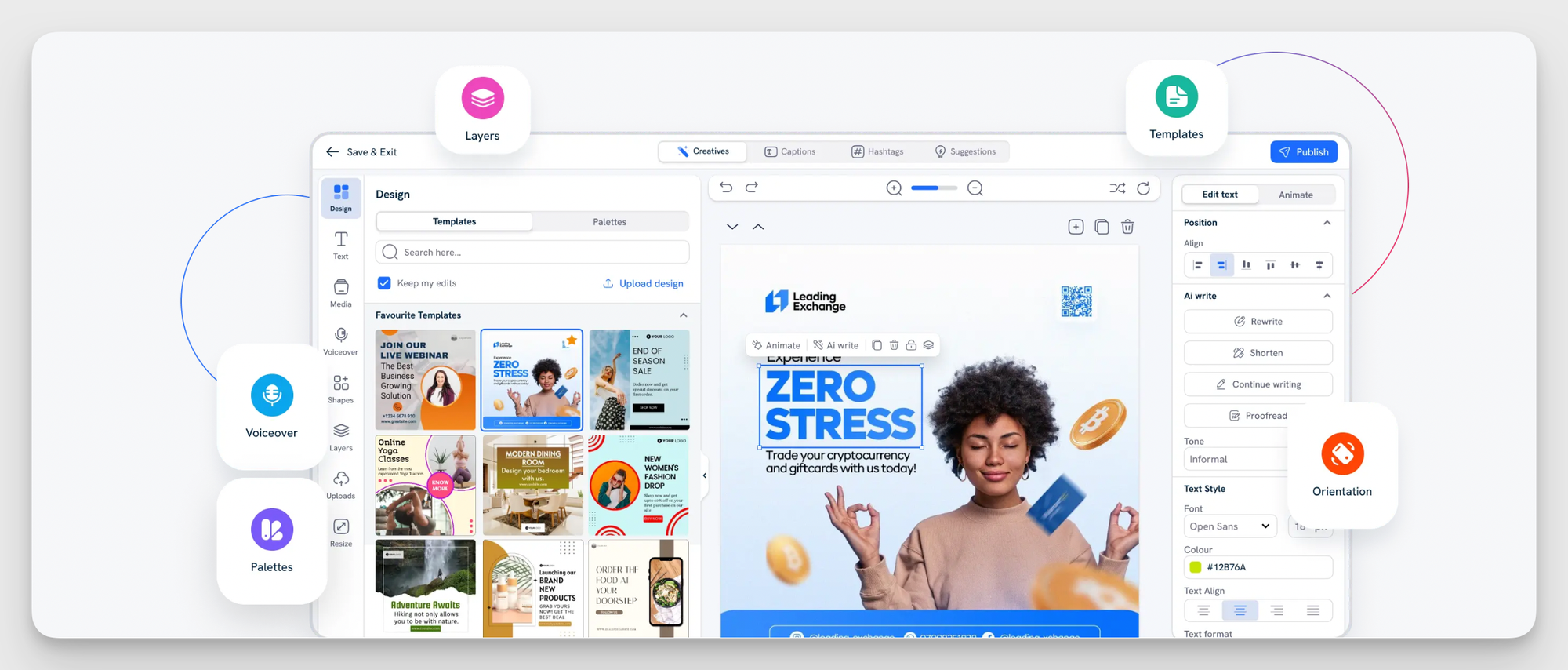
Main capabilities:
- AI content generation from text prompts: When testing it, I was surprised to see that with just a 4-word prompt, Pedris.ai created several social media posts. The great part about it? brand guidelines, things like logo, brand colours, etc., and creates on-brand content instantly.
- Instagram carousel creator: Carousels are all the rage on Instagram, and Pedris.ai does an excellent job at generating multi-slide carousels with cohesive design and basic copy you can tweak.
- Video and reel generation: Pedris.ai creates scroll-stopping videos and reels for social media based on your prompt by going through stock video libraries. It adds animations, text, images, effects and transitions to further optimise them.
- AI ad copy generator: Pedris.ai generates animated and static ad creatives optimised for different social platforms, along with a text-to-ads generator for quick variations.
- E-commerce integration: This AI social media tool integrates seamlessly with Shopify and offers specialised features for online stores. It pulls all the product data from your online store and creates promotional posts for social media.
Pricing
Predis.ai uses a credit-based system. Here are the 2025 tiers:
- Free Plan: $0/month
- Lite Plan: $32/month
- Premium Plan: $59/month or $588/year
- Agency Plan: $249/month or $2,484/year
Free trial available (30 posts), no credit card required
Best suited for
Predis.ai is ideal for agencies that need to generate high volumes of content quickly across multiple client accounts.
It's particularly valuable for you if you’re an e-commerce brand with a Shopify store and need consistent product promotional posts. Or if you’re part of a small team or solos who lack design resources but need visually appealing carousels and ads.
Reviews
Jock B, Media consultant, says: "The ease of use and speed to develop social posts is astounding, and with a few tweaks, you can have a week's posting done in no time at all."
#8. Publer - best for visuals generation
Publer calls itself your ‘virtual social media superhero’ and when it comes to AI powered visual creation and bulk scheduling, it actually lives up to the hype.
It is primarily built for social media managers, agencies and content creators who want to create a lot of stunning visuals and schedule them.

Main capabilities:
- AI image generation with DALL-E 3: After testing it, I'd say that one of Publer’s best and most powerful features, is that it allows you to generate completely unique visuals for your brand with a single prompt. No need for stock photos or design skills. Whether you need product mockups, abstract backgrounds, or graphics for a campaign, it does it all quite easily. Really liked it.
- Seamless design tool integrations: If you’re a Canva lover like me, you’ll love that Publer integrates easily with Canva and VistaCreate, allowing you to create graphics without leaving the platform.
- Multi-platform visual customization: Upload your visual once and then easily customise it for different platforms and content types depending on where you’re going to post it.
- Bulk scheduling with CSV upload: After creating visuals, you can schedule up to 500 visual posts at once via a CSV file. Instead of wasting hours manually scheduling each post, Publer helps you schedule them in bulk within minutes.
- AutoSchedule (content queues): Create predefined posting schedules with specific time slots and content types, then let Publer automatically slot new visual posts into the earliest available time. Set up different content mixes for different days and Publer handles the rest.
- Link in bio builder: You can create a customised visual landing page for your Instagram bio to house multiple links via Publer.
Pricing
Publer’s current pricing structure is,
- Free Plan: $0
- Professional Plan: Starting at $12/month (for 3 accounts, 1 user)
- Business Plan: Starting at $21/month (for 3 accounts, 1 user)
- Enterprise Plan: Custom pricing
Best suited for
Publer works best for visual-first, Instagram-focused brands in the retail, beauty, luxury and fashion niches. Agencies looking to create visual asset libraries for multiple clients, content creators and influencers who batch visual content for the month and schedule it in advance will all benefit from Publer.
However, I think that Publer isn’t ideal if you need extensive image and video editing.
Reviews
Joseph L, in Real Estate says:
My overall experience has been fantastic. I just completed my first test post and was impressed with how seamless everything felt. Publer made the process efficient, fast, and surprisingly fun. It’s already earned a place in my daily toolset.
#9. Visme - best for multi-format design + AI-powered social content
Visme positions itself as a powerful all-in-one creative suite, and when it comes to designing high-quality social visuals, repurposing content formats, and scheduling posts, it genuinely delivers.
It’s built for social media managers who want more than quick templates: Visme gives you AI creative power, advanced design depth, and the ability to manage every visual project from one dashboard.
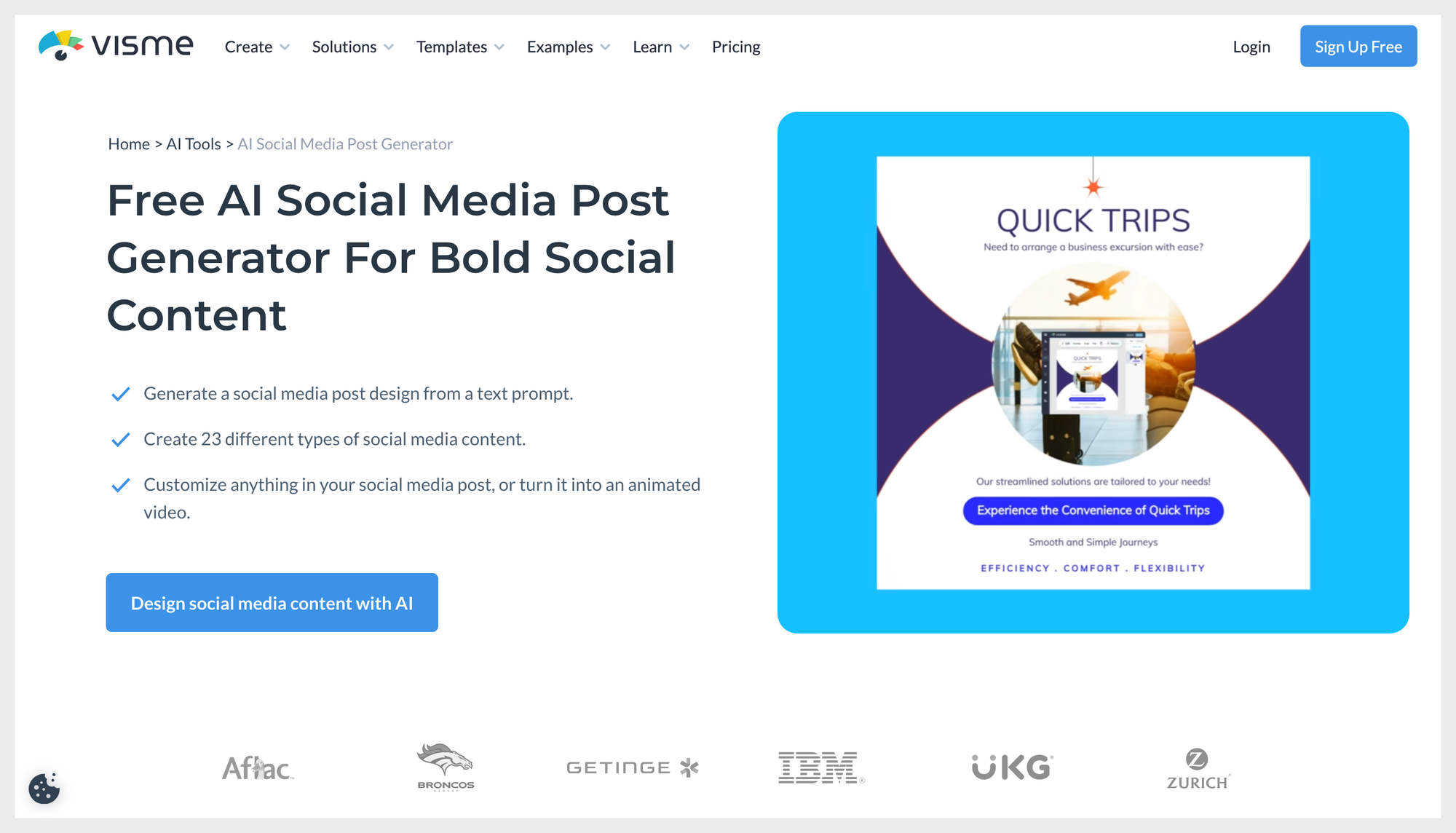
Main capabilities:
- AI-powered content creation: Visme’s strongest capability is its suite of AI tools, from the AI designer and image generator to the AI writer. With a single prompt, you can produce social posts for Instagram, Facebook, TikTok, LinkedIn, and more. You can refine prompts, swap layouts, and edit text or visuals to keep everything aligned with your brand identity.
- Versatile creative formats: Unlike tools that only focus on static visuals, Visme lets you create 23 different types of social media content, including posts, stories, animations, videos, ads, and carousels, making it incredibly flexible for multi-platform strategies.
- Ready-to-customize templates: Visme offers thousands of professionally designed templates. You simply pick one and adjust colors, fonts, layouts, or elements to match your brand. Everything is fully customizable, even for non-designers.
- Links and files as content sources: One standout capability is the ability to turn links and files into content inputs. You can paste an URL, upload a file, and Visme will analyze it to generate copy or visuals you can preview and schedule instantly.
- 3D graphics & advanced visuals: Visme goes far beyond basic graphics. You can add 3D shapes, characters, illustrations, animations, and standout text effects. This brings depth and originality to social media posts without requiring external tools.
Pricing:
- Free plan available
- Starter at 12.25$ per month (paid annually)
- Pro plan at 24.75$ per month (paid annually)
- Enterprise plan has customized pricing, you can pay as you use.
Best for:
Visme is perfect for social media managers who need to produce a wide range of visual content (from webinars to product explainer videos and tutorials), not just static posts. If you’re working across multiple platforms and formats—presentations, carousels, videos, brand assets, social posts—Visme lets you build everything in one place. It’s especially strong for brands that want polished, high-production visuals without hiring a design team.
However, Visme may not be ideal if you need full video editing power or advanced animation tools beyond what’s built in.
Reviews:
Lettie C., in Education Management, says:
“I have had a great experience with Visme. The product is easy to use and I love the creativity that blooms every time I go through the templates! The resource tools are also great in that they are very easy to understand...there isn’t anything that is too difficult to understand. I love using Visme!”
#10. VEED - best for video generation
Veed is a browser-based video editing AI platform that has transformed how marketers, content creators and agencies are creating videos at scale. Instead of spending hours wrestling with complicated video editors, simply open Veed in your browser and start editing right away.
The best part about Veed?
It’s AI-powered, which helps you create videos from text prompts, generating accurate auto-subtitles, and producing video content that’s optimised for different social platforms.
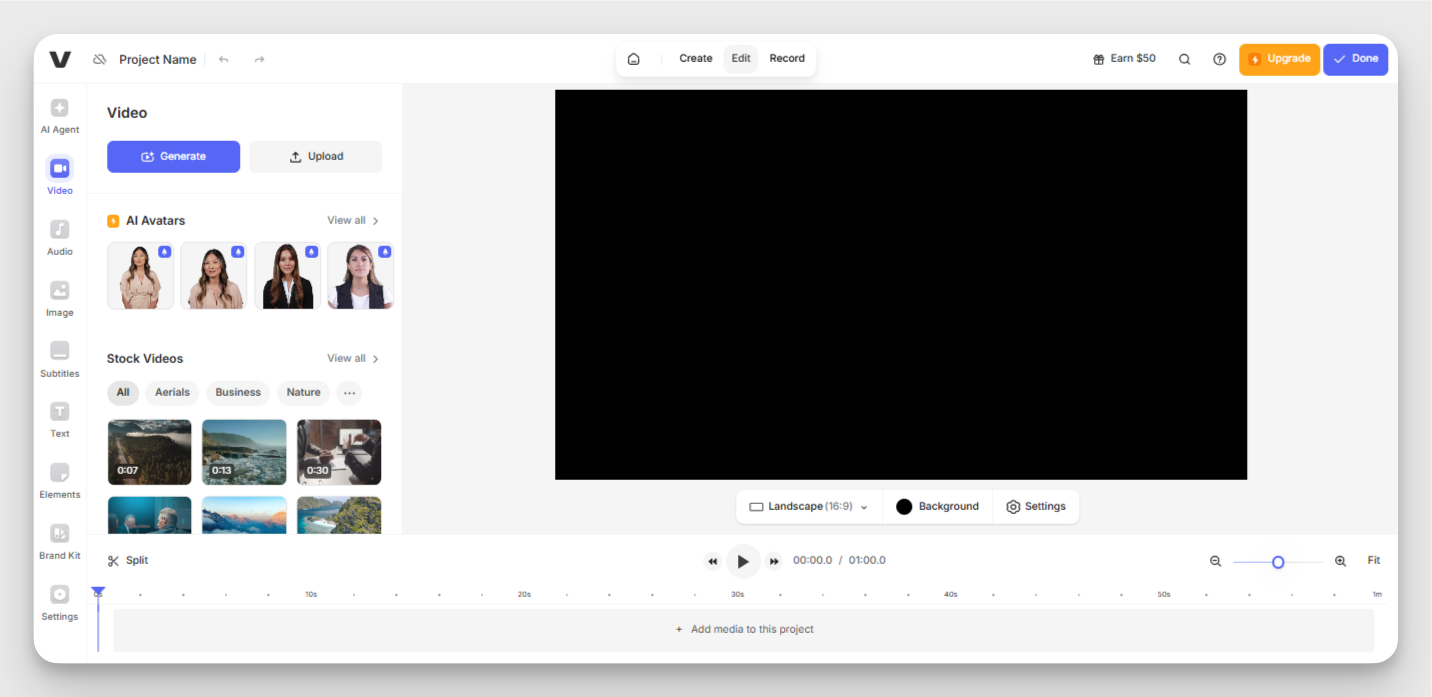
Main capabilities:
- AI video generation with specialised AI video models: With simple text prompts, you can create complete videos and generate scripts with matching visuals. Perfect for marketers who need product videos, promotional videos, and all other kinds of social media videos without picking up the camera.
- AI agent - natural language editing: Veed’s best feature is its AI-powered editing assistant that does all the heavy lifting for you. All you need to do is type commands like ‘add music’, or ‘create subtitles’, and it executes it.
- Auto subtitle and AI captioning: This is the feature that almost all Veed users love the most, including myself. VEED supports 120+ subtitle languages with 95%+ accuracy. All you need to do is upload your video, and Veed handles the rest. It transcribes the video and generates subtitles in minutes. You can customise the text, the animations, and all other fun parts of the captioning process. Export subtitle files as SRT, VTT, or TXT, or burn them directly into the video.
- AI avatars & voice dubbing: Veed’s AI avatars are beneficial for people who do not want to appear on the videos themselves. And Veed’s AI Dubbing tool can translate and dub videos into 29+ languages with lip-sync technology. Excellent for creating global video campaigns. And here's a part that I liked. You can also clone your own voice and have AI mimic it for your videos or choose from the plethora of pre-built voice profiles available.
- Magic cut: Magic cut automatically removes filler words and silences from your videos, cleaning up voiceover videos, podcasts and interview videos in a jiffy.
Pricing
Here are the current tiers:
- Free Plan: $0
- Lite Plan: $12/month (billed annually) or $24/month (monthly billing)
- Pro Plan: $29/month (billed annually) or $55/month (monthly billing)
- Business Plan: $59/month
- Enterprise Plan: Custom pricing (contact sales)
Best suited for
Veed is best for marketing managers of small business, content creators, and influencers who need help generating simple social media videos with accurate subtitles and minimal learning curve.
But if you’re looking for advanced editing features like color grading, complex effects, or frame-by-frame precision, then it’s not the right platform for you.
Reviews
Julia S, Digital Marketer says:
I love Veed’s usability. It is really intuitive, and uses AI for functions such as generating subtitles. There are so many ways in which you can edit your video, with styles and music. I use Veed a couple of times a week to edit videos for clients and it is always seamless.
#11. Opus Clip - best for video editing
If you’re looking for an AI social media tool to turn your long-form content into scroll-stopping short videos for social media, Opus Clips is the video clipping tool for you.
It finds the best moments in your long video and chops them into multiple short clips, adds captions, visual effects and transitions - basically doing all the hard editing work for you.
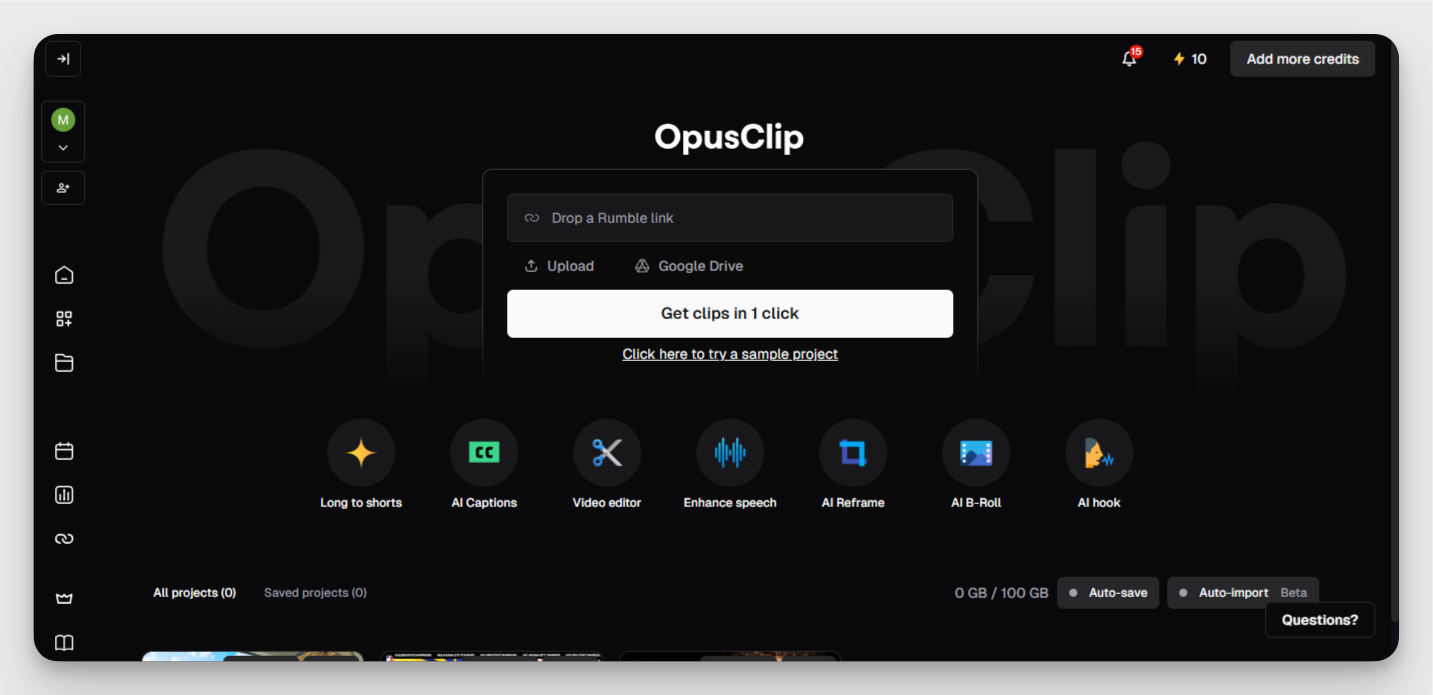
Main capabilities:
- ClipAnything AI - finds your best moments automatically: When you upload your video on Opus Clip, it finds the most interesting moments in it, and turns them into short, snackable clips. It works on all kinds of videos, not just talking-head podcasts. You can also give it simple instructions to find specific moments in the video and it’ll do that for you.
- Virality score - predicts which clips might go viral: What I found interesting was that Opus Clip gives a virality score - from 0 to 100 - to your clips depending on how catchy the intro is and whether it follows the patterns of other viral clips.
- Auto-captions: Like most other video editing tools, Opus Clip also generates automatic captions for videos which are mostly accurate. You can customize text, fonts, and animations for each video. It works in 25+ languages including English, Spanish, German, French, Portuguese, Japanese, Korean, and Vietnamese
- ReframeAnything - smart video resizing: Reframe Anything automatically resizes your clips for different social platforms, using AI technology to keep everything in the frame centred.
- Cleans up your video’s audio: Opus Clips removes filler words, silences and cleans up your video’s audio perfectly.
Pricing
Opus Clip uses a credit system where 1 credit = 1 minute of video you upload.
Here are the different pricing tiers it offers:
- Free Plan: $0/month
- Starter Plan: $15/month
- Pro Plan: $29/month or $174/year (save 17% with yearly)
- Enterprise/Business Plan: Custom pricing (call for quote)
Best suited for
Opus Clips is a quick and easy to use video editing tool built for teams that need to post content every single day without spending hours on editing.
However, if you’re looking for advanced editing features or an AI social media tool that doesn’t need any tweaks or effort from your side, Opus Clips isn’t for you.
Reviews
Treyson N, Product Manager says:
I like how much time Opus saves the user while still developing a professional product. I think it's a game changer with all the tools it offers including AI, and it customizes videos like captions and formats very well. I like how easy it is to edit these clips. I'm able to remove any awkward moments by eliminating pauses, filler words, etc.
Final thoughts
Having tested these 10 AI tools, I can honestly say they’re a lifesaver. They’ve helped me cut down on repetitive tasks, analyze what’s really working, and create content far faster—without losing my brand’s unique voice or standards. The real value, for me, is how these platforms work together to free up my schedule so I can focus on strategy and creativity, not just posting for the sake of it.
No tool is perfect for everyone, but if you start by focusing on where you’re wasting the most time, you’ll quickly find the best match. My advice? Use AI to handle the heavy lifting, so you can get back to growing your brand and connecting with your audience. In 2026, those who use AI intentionally will be the ones setting the pace on social media.
Analyze your competitors in seconds
Track & analyze your competitors and get top social media metrics and more!
You might also like
Improve your social media strategy with Socialinsider!
Use in-depth data to measure your social accounts’ performance, analyze competitors, and gain insights to improve your strategy.




